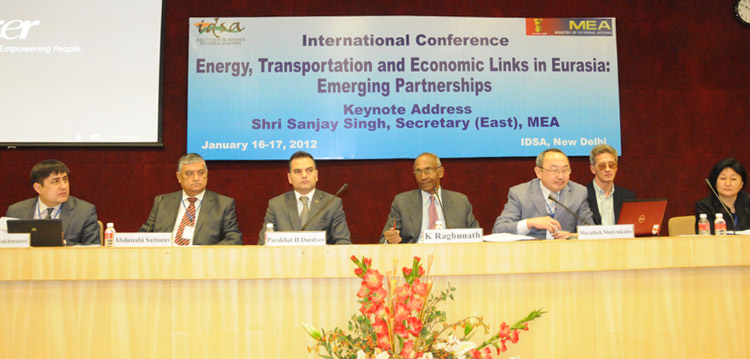You are here

Chair: Ambassador (Retd) K Raghunath
Panellists: Ambassador Parakhat H Dudyev, Dariya Mukhamejanova, Abdunabi Sattorov, Shukhrat Rakhmanov and Muratbek Shaiymkulov.
This session focussed on economic cooperation between India and the Central Asian states, especially in the Energy, Transport and Communication sectors.
Amb (Retd) Raghunath dwelled on the need to explore the untapped natural and human resource potential of the Central Asian region and deliberated on the need to step up India’s engagement with the region. He suggested the formation of different joint task forces to achieve this goal.
Ambassador Parakhat Dudyev observed that despite India and Turkmenistan’s deep historical and cultural bonds and shared values, trade volume between the two countries is low and therefore, needs to be improved. He discussed Turkmenistan’s unique governance system and highlighted the country’s neutral foreign policy posture. Amb Dudyev argued that Turkmenistan is committed to supply gas to India although there is still no consensus on the price of the gas. Moreover, Turkmenistan is willing to assist in the process of ensuring stability in Afghanistan.
Ms. Dariya Mukhamejanova highlighted role of Asia as a key driving force behind the world economy. She dwelled on the economic significance and role of Kazakhstan in Central Asia. With Kazakhstan being the undisputed leader of economic development in the region, she deliberated on the need for a comprehensive economic cooperation with India.
Mr. Abdunabi Sattorov dwelled on Tajikistan’s massive untapped hydro-power potential. He argued that development of infrastructure of this sector can result in the country supplying surplus electricity to Pakistan, Afghanistan, China and India. Moreover, existing and under construction highways in Tajikistan do provide an opportunity to turn the country into one of the main transit partners in Central Asia and help in expanding the country’s economic and trade cooperation with the rest of the world. He elaborated on India’s opportunity to provide engineering expertise in constructing hydro power plants and developing the transport sector.
Mr. Shukhrat Rakhmanov highlighted the close historical relationship between Uzbekistan and India. However, in order to realize the full potential of the relationship, it is imperative to diversify the economic content of the partnership and focus on sectors like IT, energy, transportation and telecommunication. He deliberated on the need for a greater India-Iran cooperation in order to develop the North South Transport Corridor. Even Uzbekistan, which is located in close proximity to where the main trade relations are carried out, tends to benefit from the effective development of this transport corridor.
Mr. Muratbek Shaiymkulov dwelled on the strong bilateral relationship between Kyrgyzstan and India. Although political engagement has been actively carried out in the last few years, the same cannot be said of the economic partnership. He advocated the need to expand the economic content of the bilateral relationship and observed that India can participate in the information, communication and gold mining sector of the Kyrgyz economy. Mr. Shaiymkulov also deliberated on the impending need to develop trans-Asiatic transport corridors.
The discussions brought to light the following major points:
a) TAPI can be a guiding force for regional economic integration and development.
b) At present there is no regime in Central Asia to control and manage transportation corridors.
c) In the backdrop of environmental concerns over gold mining, the Kyrgyzstan government is developing new sets of rules for environmental protection.
d) India needs to develop long term economic strategies with Central Asian Republics and there should be a greater participation of the private sector in this region.
e) India should aim to develop a strategic partnership with countries of this region and not limit itself to trade, energy and connectivity issues.
